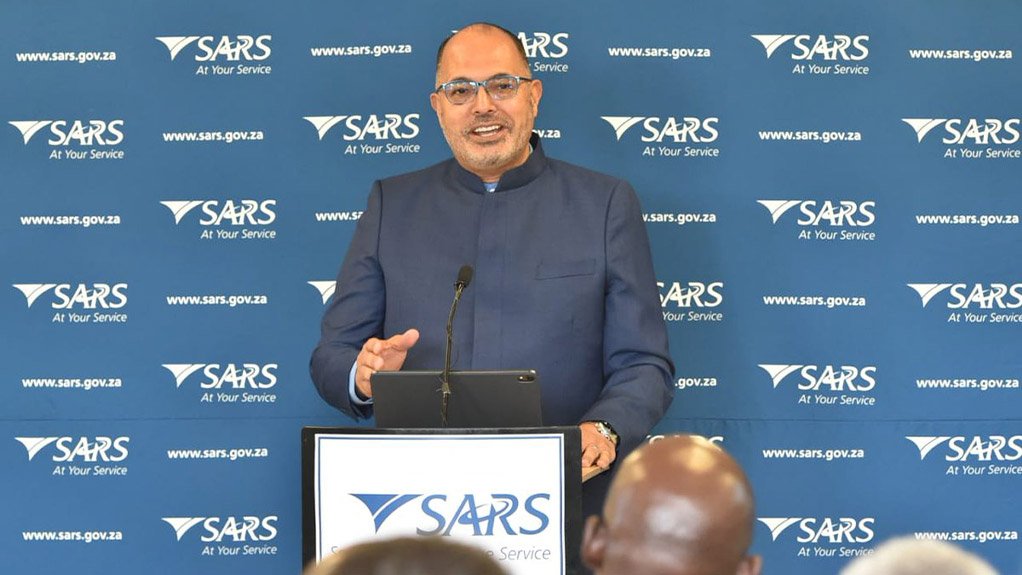South African Revenue Service (Sars) Commissioner Edward Kieswetter on March 13 explained the revised revenue estimate presented by Finance Minister Enoch Godongwana in the Budget tabled in Parliament on March 12 and how it benefits the organisation.
The Minister announced an increase in the revenue estimate to R1.85-trillion, from R1.84-trillion announced in last year’s Medium-Term Budget Policy Statement.
The revised revenue estimate's improvement from the October 2024 estimate reduces the shortfall against the February 2024 estimate, set at R1.86-trillion, from R22.3-billion to R16.7-billion.
Godongwana also increased the size of Sars’ budget by R4-billion, bringing the total over the next three years to R7.5-billion.
Kieswetter previously estimated the tax gap owing to uncollected tax and outstanding returns at R800-billion.
Sars last year presented a business case to Godongwana that if the organisation were given an additional R1-billion, it could collect between R30-billion and R60-billion in extra revenue, on the back of more expertise employment and capacity for investigations.
“Our country continues to face tough economic conditions, which have consequently shifted economic assumptions negatively. Despite this difficult economic environment, the projected revenue performance will lift the tax-to-GDP ratio up slightly to 24.7% in 2024/25, compared to 24.5% in 2023/24.
“The tax buoyancy ratio has improved to 1.12 from the prior years of 0.66,” Kieswetter explains.
Sars is focusing on increased revenue collection, compliance enhancement and the facilitation of legitimate trade.
The approach involves analysing how economic trends and tax and customs policies affect revenue collections. By implementing its compliance programme effectively, Sars is better positioned to collect all revenue owing to the fiscus. The ongoing investment in Sars is essential to ensure effective tax administration.
Overall employment and consumption taxes have and are expected to perform strongly towards the end of the 2024/25 financial year while import taxes and fuel levies are expected to underperform.
Corporate taxes have grown positively except for mining corporate taxes that continue to underperform owing to declining volumes and prices, coupled with challenges in the networked logistics sector.
Sars remains firmly committed to making its contribution to foster an environment that supports and stimulates economic growth.
Overall, as at February 28, tax collection yielded a net revenue of R1.6-trillion, of R2.07-trillion gross revenue collections, and R413.3-billion total refund payments.
In the same period, value-added tax (VAT) refund payments were R338-billion, reflecting growth of R21.3-billion, or 6.7%, from the previous financial year. The growth in VAT refunds was driven by VAT credit returns submitted (in liability value) in relation to increased input tax declared.
“Sars’ revenue collection accounts for 90% of government expenditure. This requires Sars to do all that is possible within its mandate to ensure that all revenue due to the fiscus is collected to support the government’s development goals, despite the sluggish economy,” Kieswetter states.
He adds that efficient and effective collection of all revenue will help to maintain overall fiscal stability. “Pursuit of domestic resource mobilisation is key to our country’s development and protecting its future.”
To meet the challenge posed by the revised estimate of R1.85-trillion, Sars will continue to sharpen its approach to tax collection, which involves enhancing compliance measures.
It will also continue to employ advanced data analytics, machine-learning algorithms, and AI, to improve service to taxpayers, whilst improving its capability to detect and respond to general non-compliance and serious tax crime.
NEW CAPACITY
The new net revenue estimate for 2025/26 is R2.01-trillion. The revenue estimate comes against the backdrop of an economic outlook that is challenging both globally and domestically.
The new net revenue contains a combination of several new policy measures, including a small increase in VAT, as well as a continued focus on administrative efficiencies.
VAT will increase by 0.5 percentage points in each of the next two years, bringing the VAT rate to 16% in 2026/27.
Sars welcomes additional funding to the organisation over the medium-term period announced by Godongwana in the Budget.
Sars will deploy these resources to pursue debt that is owed to the organisation and all outstanding returns.
“It will also be used to modernise and strengthen its technology capability especially the use of data science, machine learning algorithm and artificial intelligence to respond to the sophisticated and aggressive schemes, including dealing with the illicit economy, which has had deleterious effect on our industry with accompanying loss of jobs and constraining our economic prospects,” Kieswetter confirms.
Moreover, the additional allocation will be used to enhance efforts to facilitate legitimate trade while also frustrating illicit activities.
The tax policy measures proposed in the 2025 Budget will have a net revenue impact of R28-billion for the 2025/26 financial year and R44.2-billion for 2026/27.
“While we have seen encouraging progress at Sars, we remain painfully aware that much more has to be done to address the tax gap and in particular modernise Sars to respond to illicit economic activities and tax crime, aggressive tax planning, and many other instances of non-compliance,” Kieswetter states.
Owing to vast amounts of tax revenue remaining uncollected, Sars’ efforts in this regard will be stepped up, Kieswetter concludes.
EMAIL THIS ARTICLE SAVE THIS ARTICLE ARTICLE ENQUIRY FEEDBACK
To subscribe email subscriptions@creamermedia.co.za or click here
To advertise email advertising@creamermedia.co.za or click here











